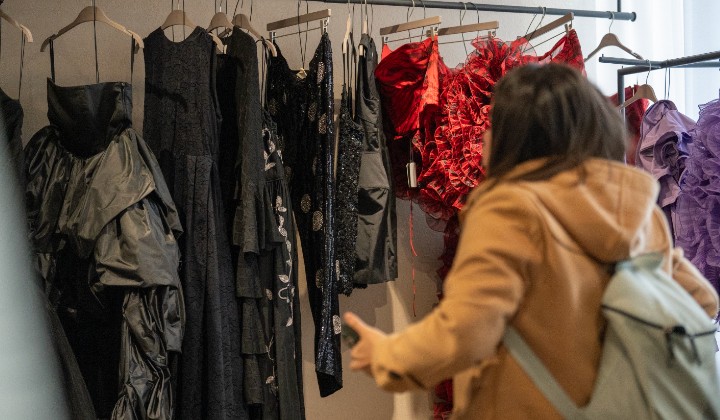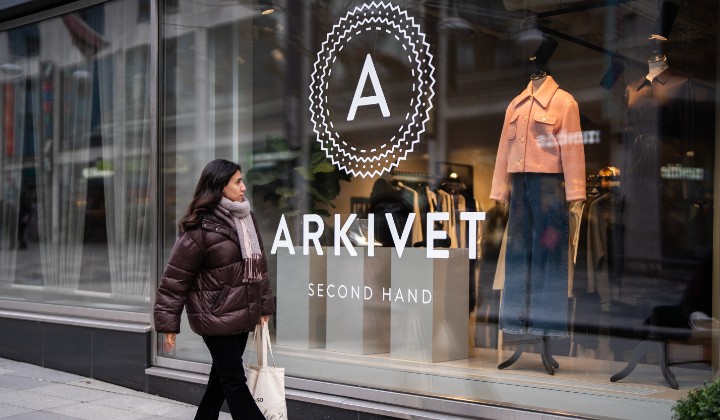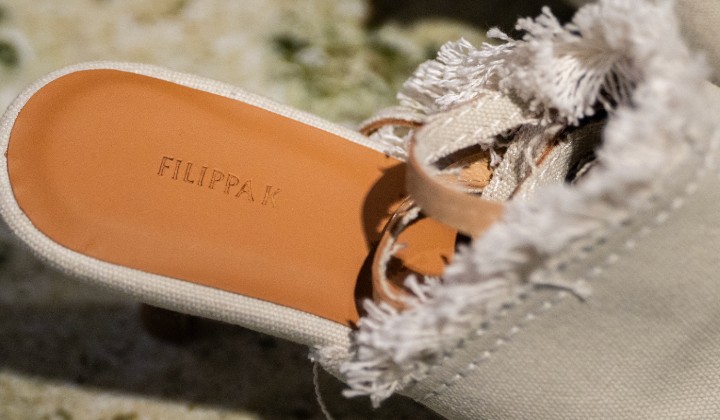Eco-Chic Revolution: How Malaysia’s Fashion Scene Is Turning Swedish Green
By tapping into Sweden’s wealth of expertise and experience in sustainable fashion, Malaysia is poised to take a quantum leap forward in its quest for a more responsible and resilient garment industry. With a focus on sustainable materials, circular economy principles, and unwavering commitment to social responsibility, Malaysia could soon emerge as a global leader in eco-friendly fashion.

Subscribe to our FREE Newsletter, or Telegram and WhatsApp channels for the latest stories and updates.
Malaysia’s fashion industry is indeed at a critical juncture, and the country can greatly benefit from emulating Sweden’s successful sustainability practices.
One key area where Malaysia can learn from Sweden is technology transfer and collaboration with Swedish companies operating in Malaysia.
Several Swedish fashion and textile companies have already established a presence in Malaysia, offering knowledge-sharing and technology transfer opportunities.
For instance, H&M, which has been at the forefront of sustainable fashion in Sweden, has a significant presence in Malaysia with multiple stores nationwide.
In a bold eco-chic move, H&M’s “Let’s Reuse” crusade, hitting the scene in 2019, now slaps a cool RM0.20 charge on every shopping bag across Malaysia, sparking a green revolution among shoppers to rock their reusable bags.
Also, eco-warriors earn an extra 10 points in their style cred for every bag saved.
The cash from these bag fees is fueling some serious change—from the World Wildlife Fund’s mission to protect our precious freshwater by slashing waste to enlightening minds on the solid waste crisis and empowering marginalized Malaysian youth with Dignity for Children’s life-changing education and skills training.
And because the future is as bright as they make it, H&M is turning up the sustainability education volume with a killer collaboration with the KidsRights Foundation in 2023.
Together, they’ve launched the State of Youth Kids platform.
Kids aged 6 to 12 can dive into their rights and the UN Sustainable Development Goals through games that are as entertaining as they are enlightening on this digital playground.
H&M Rocks the Eco-Stage: Striking a Chord for Global Sustainability in Fashion
In another eco-forward move, H&M is amping up its commitment to dial down the environmental toll of fashion, tackling the industry’s notorious water wastage and waste production head-on.
Despite not owning any factories and having a complex web of suppliers that transform raw materials into trendy pieces on store shelves, H&M isn’t using this as an excuse to shirk responsibility.
The fashion giant is strumming a different tune, especially regarding its global supply chain – Malaysia included.
Enter the Sustainable Impact Partnership Programme (SIPP), H&M’s headline act in the sustainability concert.
This initiative isn’t just about setting the bar; it’s about lifting everyone to it.
Suppliers must embrace H&M’s Sustainability Commitment, a setlist that includes hits like transparency, environmental impact reduction, and ensuring positive impacts on people.
It’s a backstage pass to a greener future, but only for those suppliers who can hit the high notes on H&M’s stringent assessment.

But H&M knows that solo acts rarely change the world.
That’s why they’re harmonizing with the Sustainable Apparel Coalition’s (SAC) Higg Facility Modules to ensure their efforts aren’t just a drop in the ocean.
This collaboration is about fine-tuning the industry’s approach to sustainability, making sure every player in the supply chain is part of the band.
So, while H&M might not have direct supply roots in Malaysia, its global strategy is clear: fashion can be fabulous without forsaking the planet.
With initiatives like SIPP, H&M is proving that when it comes to sustainability, they’re not just talking the talk; they’re walking the walk—in eco-friendly shoes.
From Home Decor to High Fashion: Malaysia and IKEA’s Sustainable Style Synergy
Another Swedish company making strides in Malaysia is IKEA, which has implemented various sustainability initiatives in its Malaysian operations.
IKEA has pledged to use only renewable and recycled materials in its products by 2030.
While IKEA is primarily known for its furniture, it produces textiles and has valuable expertise in sustainable material sourcing and production.
Malaysian fashion brands could collaborate with IKEA to explore sustainable materials like organic cotton, recycled polyester, and lyocell in their collections.
In addition to these large Swedish companies, there is potential for collaboration with smaller Swedish sustainable fashion brands looking to expand into the Malaysian market.
Through initiatives like the Swedish Fashion Council’s Sustainability Guide (Swedish Fashion Council, 2021), the Swedish government could facilitate partnerships between Swedish and Malaysian fashion brands, enabling technology transfer and knowledge sharing.
Malaysia can also benefit from collaborating with Swedish research institutions and universities at the forefront of sustainable fashion research.
For example, the Swedish School of Textiles at the University of Borås is a leading institution in sustainable fashion research, focusing on circular design, sustainable materials, and supply chain transparency.
By establishing research partnerships and exchange programs with such institutions, Malaysia can accelerate its adoption of sustainable fashion practices and technologies.
Stitching Sustainability into Style: Malaysia’s Circular Fashion Revolution Inspired by Sweden
Integrating the concept of circular fashion, as exemplified by initiatives like Arkivet in Sweden, can significantly bolster Malaysia’s sustainability efforts in the fashion industry.
Arkivet stands out as a pioneering example of circular fashion through its innovative approach to extending the lifecycle of fashion items.
This model promotes the reuse and recycling of garments, emphasising the importance of reducing waste and encouraging more sustainable consumer behaviours.

Incorporating such a circular fashion model into Malaysia’s strategy could involve establishing platforms for exchanging, renting, or resale garments, encouraging consumers to participate in a more sustainable fashion ecosystem.
This approach aligns with the global shift towards sustainability and could position Malaysia as a forward-thinking player in the international fashion industry.
Moreover, collaboration with Swedish entities like Arkivet could provide Malaysian fashion brands and retailers valuable insights into effectively managing such platforms.
Learning from Sweden’s experience, Malaysia could adapt these practices to suit its local context, potentially exploring partnerships with local designers, brands, and tech startups to create a uniquely Malaysian circular fashion ecosystem.
By fostering a culture of sustainability within the fashion industry, Malaysia can reduce its environmental footprint while tapping into the growing global demand for eco-friendly and ethically produced fashion.
Inspired by successful Swedish models, this move towards circular fashion could be a cornerstone of Malaysia’s strategy to achieve a greener, more sustainable fashion industry.

Green Threads: Malaysia Weaves Sustainability with Swedish Innovation for Fashion’s Future
The Malaysian government could consider implementing policies and incentives to encourage partnerships between Malaysian and Swedish fashion companies to facilitate technology transfer and collaboration.
This could include tax incentives for Malaysian companies that adopt sustainable technologies and practices from Swedish partners or grants for collaborative research projects focused on sustainable fashion.
Malaysia can accelerate its journey towards a more sustainable fashion industry by leveraging technology transfer and collaboration opportunities with Swedish companies and institutions.

This collaborative approach, combined with the adoption of sustainable materials, circular economy initiatives, and a commitment to social responsibility, can help Malaysia emerge as a leader in sustainable fashion, following in the footsteps of Sweden’s success.
In an interview with Bernama, the Swedish Ambassador to Malaysia, Dr Joachim Bergström, emphasized Swedish businesses’ proactive role in Malaysia, spearheading sustainability initiatives across various sectors.
These companies are not just focusing on the broader concept of sustainability but diving deep into specific areas critical for environmental stewardship.
In many ways, Sweden and Malaysia are very like-minded. We are both small countries with a long history and tradition in trading. We both have a long history of being neutral and non-aligned.
Swedish Ambassador to Malaysia, Dr. Joachim Bergström on Malaysia and Sweden developing joint efforts to combat climate change and promote sustainable practices.
This includes pioneering green manufacturing processes that minimize ecological footprints, transforming transportation and mobility solutions to be more eco-conscious, and leading the energy sector’s transition towards renewable and sustainable sources.
Swedish Ingenuity Meets Malaysian Sustainability: Pioneering a Greener Future Together
Through active engagement with local stakeholders, Swedish firms are setting a precedent for how international collaboration can drive significant progress in sustainability efforts, showcasing a commitment to advancing their business interests and contributing positively to Malaysia’s environmental goals.
Sweden’s “Pioneer the Possible” initiative, facilitated by the Swedish Embassy in Malaysia, is an ideal platform for this collaboration.
It aims to foster dialogue, promote sustainable development, and encourage the exchange of innovative solutions between the two nations.
Approximately 90 Swedish companies operate in Malaysia, as reported by the Malaysian Investment Development Authority (MIDA) and echoed by the Swedish embassy, highlighting Sweden’s substantial presence in the country.
This matters because these companies bring expertise in sustainable practices, technology transfer, and innovation.
Their presence in Malaysia is a testament to the potential for Swedish-Malaysian collaboration in driving environmental and economic progress.
The significant number of Swedish businesses in Malaysia underscores the potential for impactful partnerships in sustainability, making a compelling case for why their role in Malaysia’s sustainability journey is pivotal.
READ MORE: The Sustainable North Star: Sweden’s Luminous Vision Beckons Malaysia
READ MORE: Igniting Young Minds: Jom Kita Bincang! A New Chapter In Children’s Literature
Get more stories like this to your inbox by signing up for our newsletter.





